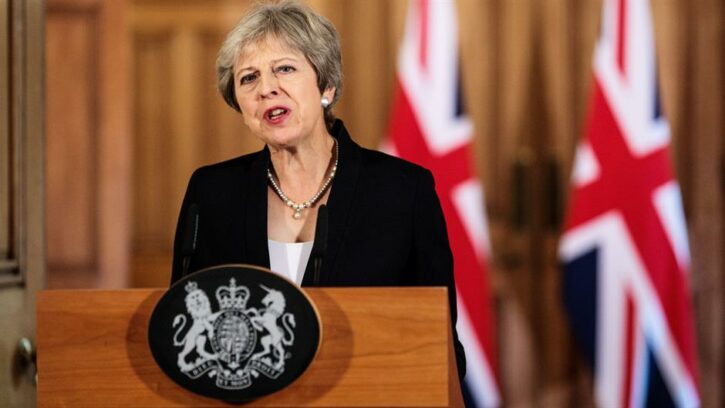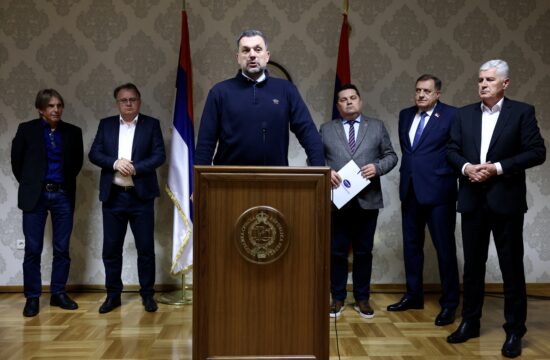
British Prime Minister Theresa May tore up her Brexit strategy on Tuesday, declaring the UK would need to seek another delay to the process of leaving the European Union and offering cross-party talks to break the political deadlock.
In a momentous statement at Downing Street, ten days before the UK is due to leave the EU with or without an agreement, May said she would implement any deal that was agreed by a majority in the UK Parliament.
“This is a decisive moment in the story of these islands and it requires national unity to deliver the national interest,” she said.
The opposition Labour leader, Jeremy Corbyn, accepted May's offer of talks, acknowledging the Prime Minister had shifted her position.
By offering to accept a compromise, May recognized that she will never be able to win round her supposed allies in the Northern Irish Democratic Unionist Party, nor a hardcore of Brexiteers in her own Conservative Party. That decision, taken after a Cabinet meeting that lasted most of Tuesday, is certain to sow deep divisions on her own side.
Signs of division
Jacob Rees-Mogg, a Conservative Member of Parliament who favours a clean break from the EU, was quick to voice his disappointment. “This is a deeply unsatisfactory approach… It's not in the interests of the country, it fails to deliver on the referendum result and history doesn't bode well for it.”
Rees-Mogg said he was resolutely opposed to May's offer of talks with the opposition. “I think getting the support of a known Marxist is not likely to instil confidence in Conservatives,” he added, referring to Corbyn's far-left politics.
In her statement, May offered to open fresh talks with the opposition Labour party leader Jeremy Corbyn to find a way forward before an emergency EU summit on April 10. May suggested that if she and Corbyn could not agree on a deal, the government would give Parliament a series of votes on Brexit options.
In a significant development, she promised to abide by whatever proposal for the UK's future relationship with Europe gained a majority in Parliament, so long as the opposition did the same. In doing so, she effectively ruled out the chance of Britain crashing out of Europe without a deal.
May said that the parliamentary wrangling of recent weeks had taken its toll on everyone. “This debate, this division cannot drag on much longer. It is putting members of Parliament and everyone else under immense pressure, and it is doing damage to our politics,” May said.
A compromise was the only way out, she said. “This is a difficult time for everyone. Passions are running high on all sides of the argument. But we can and must find the compromises that will deliver what the British people voted for,” she added.
Cross-party talks
Corbyn said he would accept the offer of talks. “We recognize that she has made a move. I recognize my responsibility to represent the people that supported Labour in the last election and the people who didn't support Labour but nevertheless want certainty and security for their own future, and that's the basis on which we will meet her and we will have those discussions.”
After May's speech, European Council President Donald Tusk signalled that the door would be open to a further delay. “We don't know what the end result will be, let us be patient,” he wrote on Twitter.
But stances are hardening among other European leaders. French President Emmanuel Macron warned earlier in the day that the EU would not be “held hostage” to UK's spiralling political crisis, telling reporters during a press conference with Irish Prime Minister Leo Varadkar that Britain will not automatically be granted another extension to Brexit.
“The third rejection of the Withdrawal Agreement by the Commons, as well as the rejections of any alternative, pave the way for a no-deal exit,” Macron said.
He added that the EU would be “open” to another Brexit plan, such as a customs union, as well as a general election and a second referendum, as potential ways forward that could help Britain secure another delay — but insisted that it was “up to London” to put any such plans forward.
Stalemate in Parliament
The parliamentary impasse was exacerbated on Monday when lawmakers failed to come to rally around any Brexit alternative during a vote at the House of Commons.
The stalemate prompted a cross-party group of MPs, including Conservative lawmaker Oliver Letwin and Labour MP Yvette Cooper, to draw up a bill to prevent a no-deal Brexit.
The plan is set to be debated and voted on over the next two days, and will likely take place instead of a third round of so-called indicative votes slated for Wednesday.
“We are now in a really dangerous situation with a serious and growing risk of no-deal in 10 days’ time,” Cooper said, according to the Press Association.
“The Prime Minister has a responsibility to prevent that happening. She needs to put forward a proposal, including saying how long an extension she thinks we need to sort things out.”




